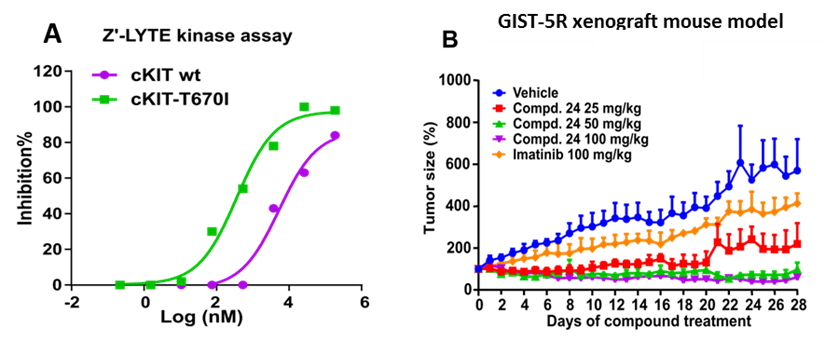Recently, a research team from High Magnetic Field Laboratory, Chinese Academy of Sciences (CHMFL) developed a novel c-KIT T670I mutant selective inhibitor (CHMFL-KIT-033) for gastrointestinal stromal tumors (GISTs).
Gain-of-function mutations of c-KIT kinase play important pathological roles in GISTs. Although imatinib is successful as the first-line therapy for GISTs, dozens of drug-acquired resistant mutations occur and c-KIT T670I is one of the most common mutants among them.
c-KIT wild-type (wt) is also known to play important roles in a variety of physiological functions, e.g., hematopoiesis. Although several kinase inhibitors can overcome the c-KIT T670I mutant, none of them can achieve the selectivity over the c-KIT wt.
In this study, the researchers discovered a novel kinase inhibitor CHMFL-KIT-033 through fragment hybrid type II kinase inhibitor design approach. This inhibitor not only showed potent activity to c-KIT T670I mutant, but also achieved 12-fold selectivity over c-KIT wt.
CHMFL-KIT-033 exhibited good anti-proliferative effects against c-KIT T670I mutant-driven cell lines GIST-T1/T670I and GIST-5R.
In addition, CHMFL-KIT-033 displayed suitable in vivo pharmacokinetic profiles and dose-dependent antitumor efficacy in the xenograft mouse model.
The results were published in the Journal of Medicinal Chemistry. It provides a proof of concept for developing c-KIT mutant selective inhibitors, which theoretically can render a better therapeutic window.
This work was supported by the National Natural Science Foundation of China and the “Personalized Medicines-Molecular Signature-Based Drug Discovery and Development”, Strategic Priority Research Program of the Chinese Academy of Sciences.

Biochemical characterization of CHMFL-KIT-033 (Imaged by WANG Beilei)
Contact:
ZHOU Shu
Hefei Institutes of Physical Science (http://english.hf.cas.cn/)
Email: zhous@hfcas.ac.cn
 Tel: +86-551-65591206
Tel: +86-551-65591206
 Fax: +86-551-65591270
Fax: +86-551-65591270
 Emai: zhous@hfcas.ac.cn
Emai: zhous@hfcas.ac.cn
 350 Shushanhu Road
350 Shushanhu Road